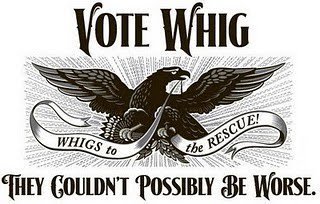
Whig Party Election Poster, 1834. Public Domain.
A June 29 Associated Press/NORC finds that 85% of Americans --- including 92% of self-identified Republicans and 78% of self-identified Democrats --- say "things in this country are headed in the wrong direction."
Meanwhile, notional support for a "third" political party remains high --- 62% as of last year's Gallup Survey --- yet no actually existing party outside the Democratic and Republican establishments seems able to get much traction.
The Libertarian, Green, Constitution, and numerous smaller third parties have labored in the vineyard of politics for decades (the Prohibition Party since 1869!) without ever coming close to shattering the "major party" duopoly.
Recent startups, also seemingly going nowhere, include Andrew Yang's Forward Party and the New Jersey Moderate Party, both of which seem more inclined to endorse simpatico "major party" candidates than field their own.
Why can't a third party break through? There are plenty of reasons, but they all come back to the fact that the "major party" duopoly is actually a monopoly.
The Republicans and Democrats aren't really two separate parties. They're a single ruling party comprised of two large feuding factions which continually re-balance power and divvy up the spoils between themselves through a burlesque of "representative democracy" rigged, by force of law to preclude meaningful competition.
From gerrymandering to preserve "safe" districts for each of the two factions, to a death grip on candidate access to ballots (which, until the late 19th century, were printed by actual parties/candidates, or hand-written by voters), to the natural inclination of big campaign money to go to the party in power rather than to upstarts and rebels, The Republican/Democratic uniparty guards its prerogatives as jealously as any banana republic or communist dictatorship.
For all the talk of "polarization" in American politics, the uniparty monopoly occupies the broad and massive center, dividing the largest and most powerful constituencies between its two factions and doling out largess to those constituencies.
"Third" parties have difficulty making inroads into those large constituencies. The "major party" benefits may be unsatisfactory, but they're birds in hand. "Third" parties are limited to the birds in the bush, the smaller constituencies the uniparty doesn't consider worth catering to.
The last really major American political realignment took place in the 1850s when the Whigs disintegrated due to their inability to unite on slavery (and Democrats split along north/south lines on the same issue), making room for the ascent of the Republicans. And within a few decades, the Democrats and Republicans had coalesced as described above to make sure no such thing ever happened again.
Absent an issue of overwhelming concern to Americans which neither uniparty faction can co-opt for its own use, we're never likely to vote our way out of this monopoly. It will end when the United States ends.
But that doesn't make third parties useless. As we've seen with issues like marijuana legalization and same-sex marriage, third parties bring forward those issues the uniparty has to co-opt to remain in power.
Which is better than nothing, I guess. But not much. And fortunately not sustainable forever.